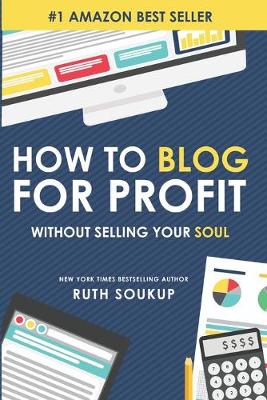Reviewed by Jane on
There is no one-size-fits-all method to blogging. Some people are going to get lucky, and I don't think we're always aware of what strategies work exactly. There were tips in here that would get a person blacklisted by Google and/or turned off by readers. Instead of teaching bloggers how to blog for profit without selling their souls, it read as though Soukup slapped low-quality screenshots and things she did onto pages -- which she did do, but that's my point: distributing blog advice should be genuine and have the possibility of working for others -- loads of them if using a book -- instead of just a select few. Moreover, reading this, I felt as if I would lose my soul if I blogged this way.
Unprofessional aspects of this book, beyond the horrendous screenshots and bad advice:
- Bitly links: Yes, they're useful, but to me, it's just tacky. A self-proclaimed professional blogger -- and, since a book has been published, self-proclaimed "expert" -- wrote this, and the polite thing to do is to set up specific landing pages for this stuff, especially since some links may change over time, and once a link is in print, you can't update it. You can't update links Bitly URLs point to, either.
* This is not to say I don't use Bitly links myself -- but I have a branded domain, and I would set up a post/page specifically for readers of a book I wrote, in the event that I had links/resources to share with them.
- Case studies: I don't like anonymous case studies, because I can't see the project/production/etc. myself. With anonymous case studies, the presenter/holder can lie and never be caught. Thus, instead of choosing people/sites whose names had to be changed in order to be published into this book, why not say, "Hey, I'm looking for people willing to participate in a few case studies I'm doing for a book I'm writing for publication." There's bound to be willing participants, you can present them with a contract outlining what is expected of them and what they'll receive, and you needn't add an asterisk after a John Doe to explain how you've changed their name for privacy. Medical case studies require anonymity; such potential educational case studies in the form of blogging, however, should not.
- Saying, "I...": It's GREAT if it works for you, but there's gotta be some other way than to keep saying, "This is how I do it," and moving on. Even if there are screenshots, it's still telling instead of showing. With educational materials, there needs to be a balance between showing and telling for it to be beneficial.
Other issues I take:
- Focuses more on Pinterest and Facebook, which can be especially harmful for those who do not work well with such platforms, do not produce content which works well with said platforms, and whose audience(s) do not chill on aforesaid platforms. The best platform(s) for one's blog is the platform(s) they use already. You don't need every platform under the sun, either.
- There is a lot of focus on the numbers. Engagement, though companies are finally taking notice, is more beneficial and important than numbers.
- It encourages people to devalue their blogs, because whilst the back cover copy claims readers of this book will stop comparing their blogs to others, there are many instances wherein Soukup compares and contrasts blogs, and indirectly promotes comparisons in the form of big vs. little bloggers because -- yes -- there is a lot of focus on numbers.
- It's an oxymoron, in that how can one blog without selling their soul if they must, indeed, sell their soul in order to attract clients -- in whatever form they may come? How would I not be selling my soul by changing core values I hold as a blogger in the hopes of brands wanting to work with me? Ingenuity is selling your soul -- plain and simple.
When I read this book, I did check out the author's website -- 'twas messy, containing low-quality graphics, and not at all mobile-friendly. Looking at her website now, it appears more professional.
At the end of the day, though, one thing always remains true: not all bloggers are meant to share blogging advice. There's a lot of recycling and "headline hacking", and most bloggers today aren't starting from rock bottom -- having to figure out everything by themselves, without any help at all -- so much of the advice can be inaccurate. Moreover, many posts are written with the intention of making money via affiliate links in their posts. This isn't to say they can't be trusted, but there comes a time when you have to ask yourself, "Would they have posted this even if no affiliate links were available, and if yes, would it still be as helpful? Would it contain less bias?"
Reading updates
- Started reading
- 19 September, 2016: Finished reading
- 19 September, 2016: Reviewed
